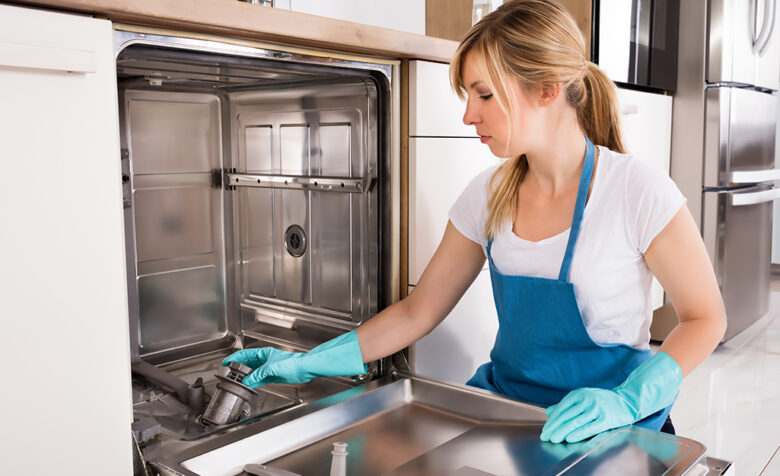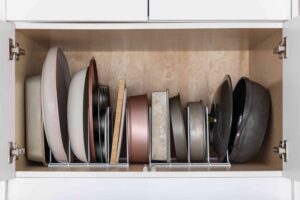A kitchen is more than just a place to cook; It is a vibrant place where people come together to work, be creative, and spend time with their families. Over time, though, all this use can mean that your kitchen needs a thorough cleaning to keep it looking nice, functioning well, and clean. This guide is intended to give you a complete plan for deep cleaning your kitchen so it becomes a healthy, welcoming place for everyone.
1. Preparing Your Kitchen for a Deep Clean
- Get your supplies: Before you start, make sure you have all the supplies you need. Here are some examples of eco-friendly cleaning products: microfiber cloths, brushes, sponges, baking soda, vinegar, and all the cleaning products you need for kitchen utensils and surfaces.
- Get rid of clutter: a tidy kitchen is easier to clean. First, clear your counters, empty your refrigerator, and put items back in their proper places in cabinets and drawers. This way you can reach all surfaces and areas that need to be cleaned.
2. The Deep Cleaning Process
- Clean your refrigerator: Since this is one of the most used kitchen appliances, your refrigerator can trap a lot of odors and spills. The area should be completely emptied, all dilapidated items thrown away and shelves and bins taken out for cleaning. Clean the inside thoroughly with a mixture of warm water and baking soda and put everything back neatly.
- Clean your oven and stove: If you want to do a deep cleaning, your oven and stove are a good place to start, as grease and burnt food can build up on their surfaces. Use the self-cleaning function if your machine has one. If not, clean it by hand with a paste of baking soda and water. If possible, remove the bones and the burner from the stove and clean them separately.
- Deep Clean Sink and Countertops: Since you prepare food in your sink and countertops, it is important to keep them clean and germ-free. For environmentally friendly cleaning, mix vinegar and water. Use a bleach solution to kill germs. Pay special attention to cracks and the area under the sink.
- Organize your cupboards and pantry: Take everything out, clean out your shelves, and consider lining them with shelf paper. Throw away old or unused items and arrange the rest in a way that suits the way you cook.
- Detox your dishwasher: To function optimally, your dishwasher needs to be cleaned. This eliminates any odors and deposits. Empty it with a cup of vinegar or dish soap.
- Microwave Magic: Don’t believe it, but microwaves are dirty. Heat a bowl of water and lemon juice in the microwave until it starts to steam. Use a cloth to clean the inside of the microwave.
- Baseboards and floors: Floors should be swept, vacuumed, and mopped, with special attention paid to cleaning corners and under appliances. The baseboard also needs to be cleaned.
- Windows and lighting: Clean kitchen windows let in more light, making the room brighter. Also, wipe down all lighting fixtures to ensure they are clean and sparkling.
3. Special Focus Areas
- Grease stains: Grease is difficult to remove. To remove grease, use a degreaser or a mixture of baking soda and dish soap on hard surfaces such as stoves and backsplashes.
- Grout and tile: Use a paste of baking soda and water and use a toothbrush to clean grout lines. Applying vinegar to tiles can restore their shine without damaging the finish.
- Maintaining your garbage cans: Clean and deodorize your garbage cans regularly to prevent them from causing unpleasant odors in your kitchen.
4. Daily Kitchen Maintenance
- Daily maintenance tips: Clean surfaces after cooking, clean up spills immediately, and do not place dishes in the sink to prevent bacterial growth and the spread of bad odors.
- Weekly maintenance schedule: Set aside tasks for each day of the week, such as cleaning the microwave, sweeping the floor, or putting things away in the pantry. This will help you keep your kitchen clean without going overboard.
- Monthly deep cleaning: Your refrigerator, oven, and cabinets may not need to be cleaned daily, but they should be included in your monthly cleaning schedule to keep everything looking good.
Conclusion
The kitchen is the most important room in your home and a thorough cleaning can be fun and refreshing. Following this guide will not only keep your kitchen clean and tidy but also make it a healthier place to cook and hang out. Remember, keeping your kitchen clean shows that you care about your home and family. With regular maintenance and attention to detail, your kitchen will always be a great place to hang out.
FAQs
1. How often should I thoroughly clean my kitchen?
Try to thoroughly clean your kitchen at least twice a year. On the other hand, certain areas of the kitchen, such as the refrigerator, pantry, and oven, may need to be cleaned more often depending on how often you use them. Small cleaning jobs should be part of your daily routine to keep your kitchen looking great all year round.
2. What is the best natural way to clean your kitchen?
Baking soda and vinegar are two of the most useful and environmentally friendly cleaning products. Most surfaces can be cleaned and disinfected with vinegar mixed with water. Baking soda is great for removing tough stains and removing odors. You can also use lemon juice to cleanse, which leaves a fresh scent after cleaning.
3. Can I use the same cleaner for everything in my kitchen?
No, cleaning different surfaces may require different products and methods. An example is that vinegar should not be used to clean granite countertops as it can damage the stone. Be sure to read the manufacturer’s instructions on cleaning surfaces and appliances.
4. What should I do about stubborn oil stains?
Dish soap mixed with baking soda can help remove stubborn grease stains. Apply the mixture to the grease stain, wait a few minutes for the grease to melt, then scrub it away with a sponge or brush. Rinse well with warm water.
5. What is the best way to clean items like ovens and refrigerators in the kitchen?
To clean your refrigerator, remove food and shelves and wipe all surfaces with a mixture of warm water and baking soda. If your oven has a self-cleaning function, use it. If not, make a paste of baking soda and water and clean it with your hands. If possible, leave it overnight. The next day, scrub and wipe vigorously.
6. How do you clean the kitchen every day?
If you perform maintenance work daily, deep cleaning is necessary less often. Wipe countertops and cooking surfaces clean after use. Sweep the floors to remove crumbs and other debris and clean up spills immediately to prevent stains. Empty waste and recycling bins regularly to prevent unpleasant odors.


